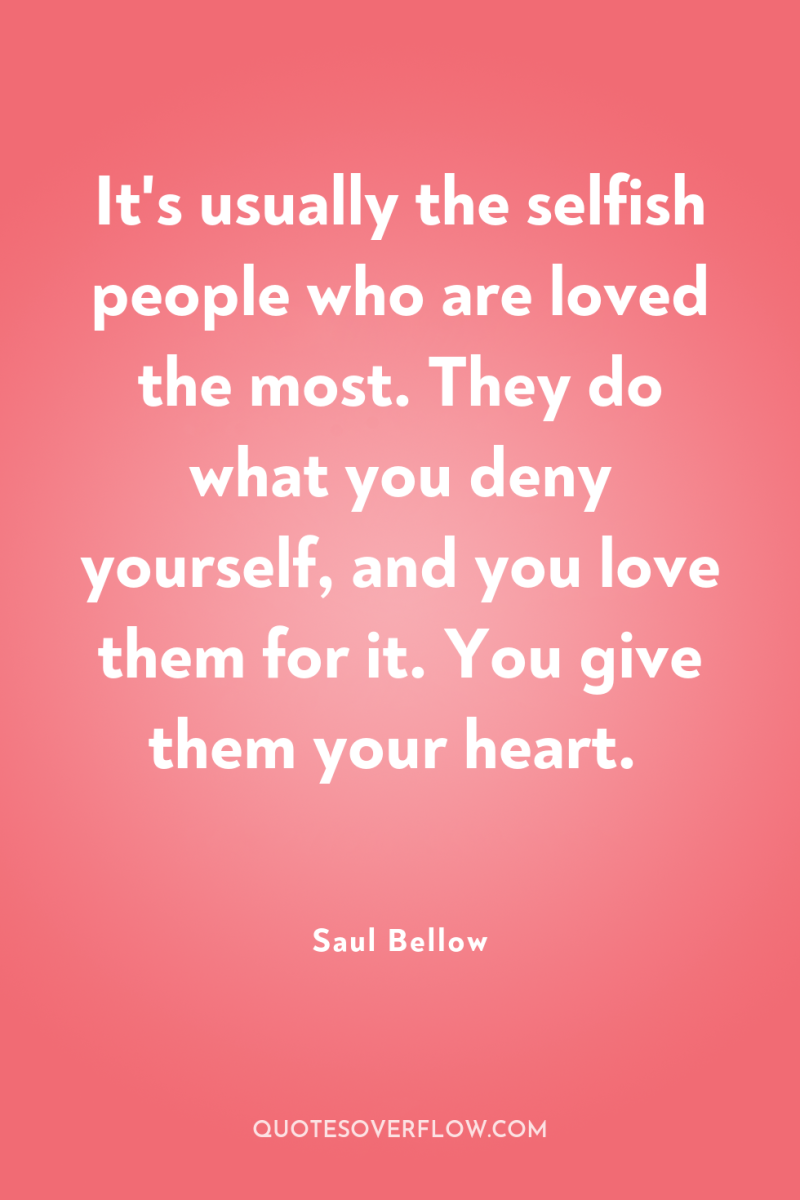
It's usually the selfish people who are loved the most. They do what you deny yourself, and you love them for it. You give them your heart.Saul Bellow
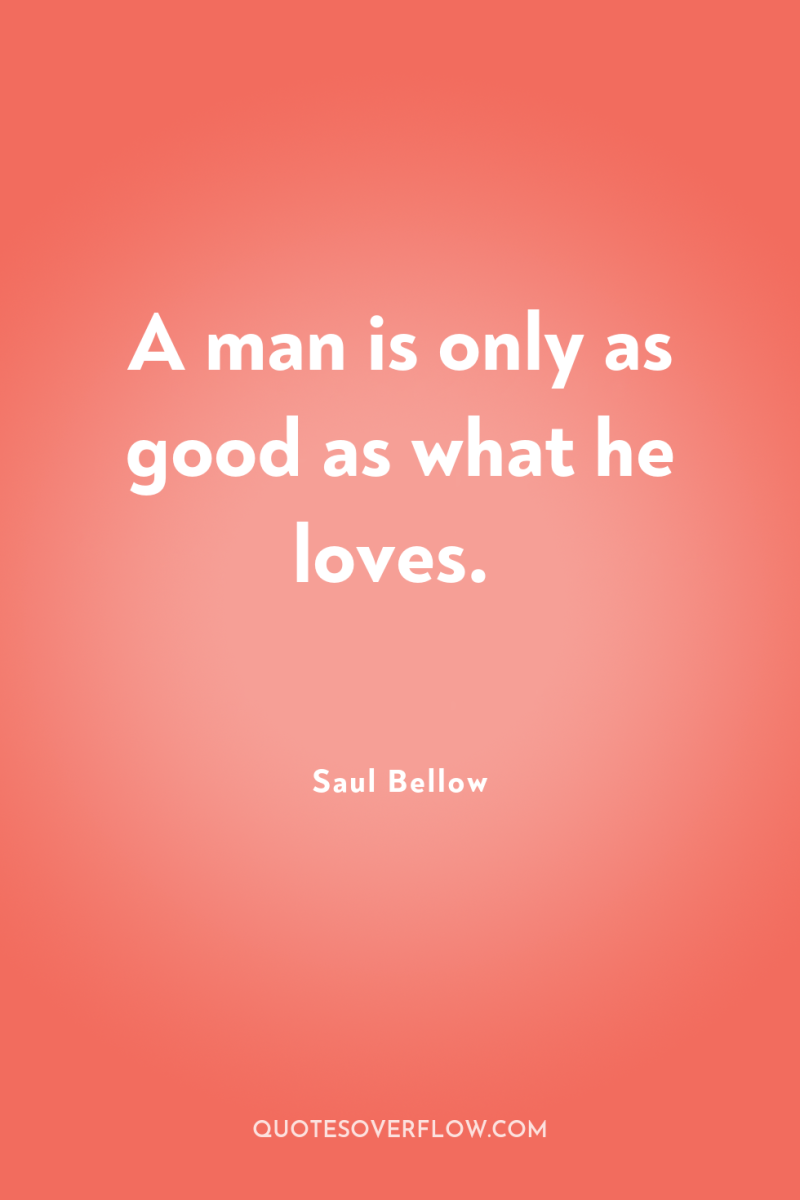
A man is only as good as what he loves.Saul Bellow
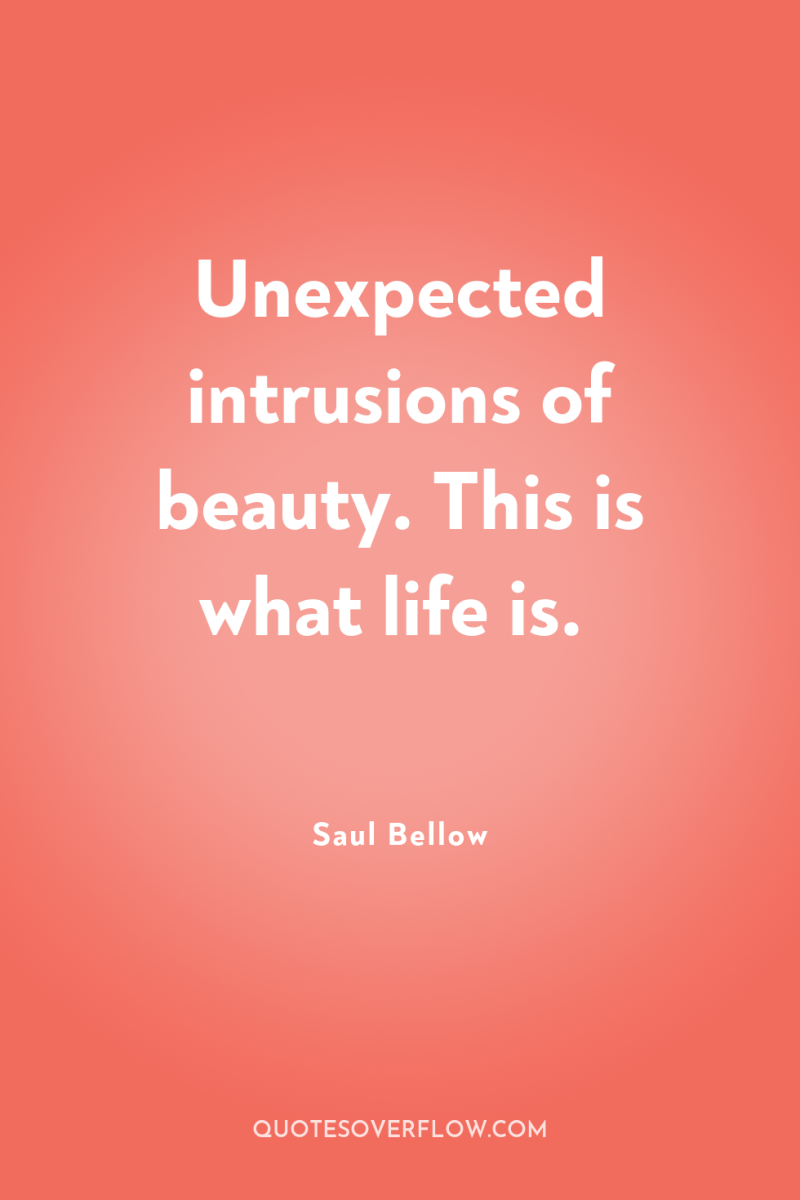
Unexpected intrusions of beauty. This is what life is.Saul Bellow
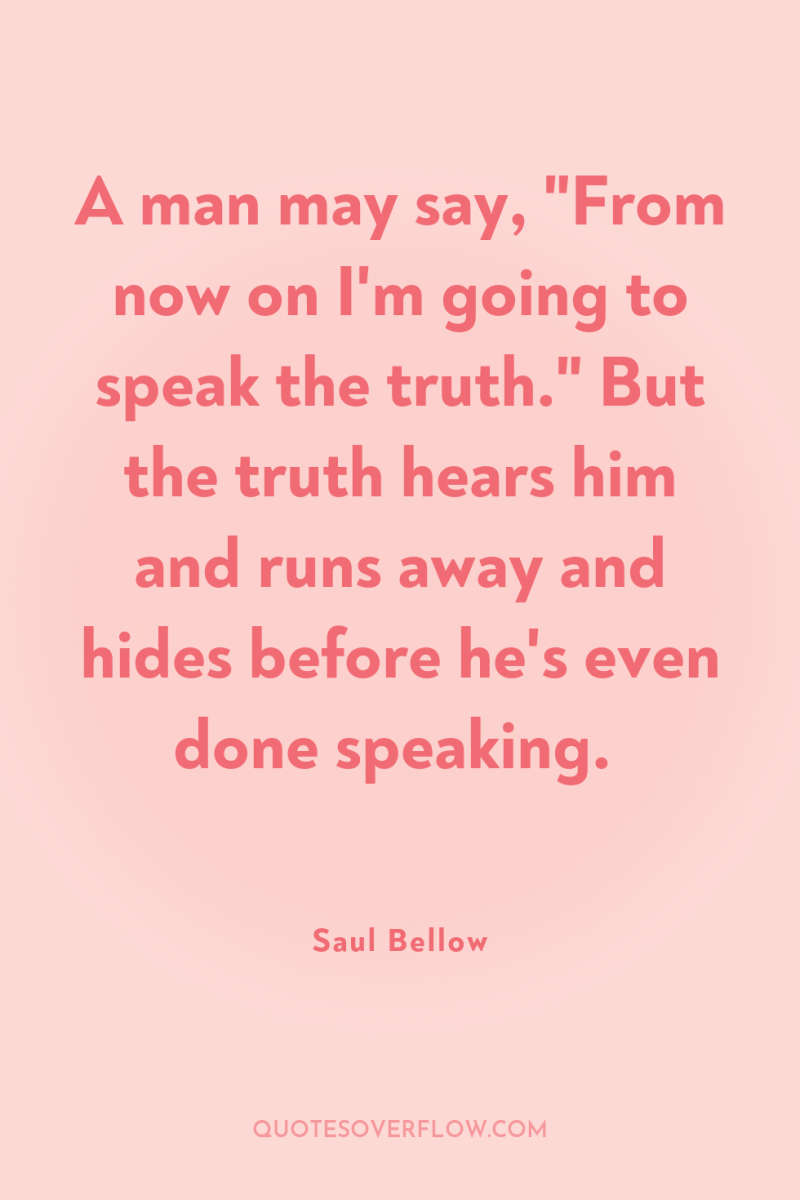
A man may say, "From now on I'm going to speak the truth." But the truth hears him and runs away and hides before he's even done speaking.Saul Bellow
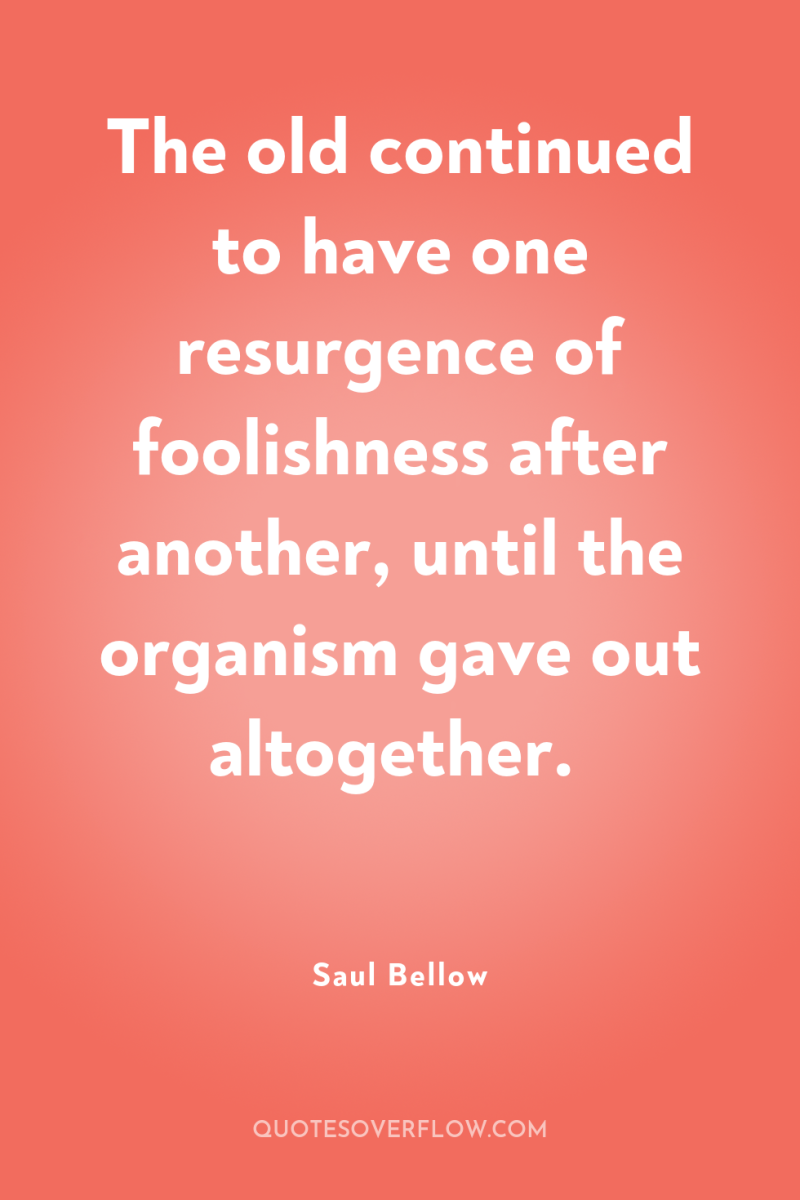
The old continued to have one resurgence of foolishness after another, until the organism gave out altogether.Saul Bellow
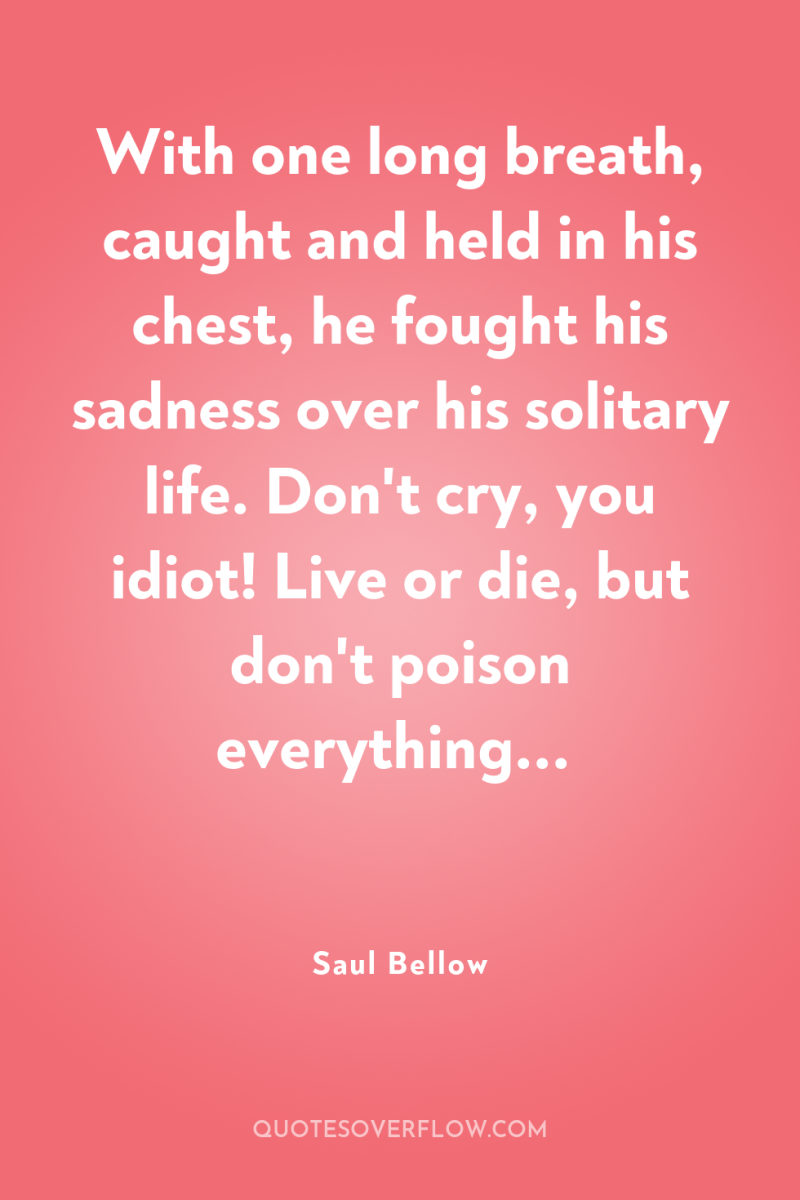
With one long breath, caught and held in his chest, he fought his sadness over his solitary life. Don't cry, you idiot! Live or die, but don't poison everything...Saul Bellow
I see that I've become a really bad correspondent. It's not that I don't think of you. You come into my thoughts often. But when you do it appears to me that I owe you a particularly grand letter. And so you end in the "warehouse of good intentions": "Can't do it now." "Then put it on hold." This is one's strategy for coping with old age, and with death--because one can't die with so many obligations in storage. Our clever species, so fertile and resourceful in denying its weaknesses.Saul Bellow
He was looking for the Knight of Faith, the real prodigy. That real prodigy, having set its relations with the infinite, was entirely at home in the finite. Able to carry the jewel of faith, making the motions of the infinite, and as a result needing nothing but the finite and the usual. Whereas others sought the extraordinary in the world. Or wished to be what was gaped at.Saul Bellow
You never have to change anything you got up in the middle of the night to write.Saul Bellow
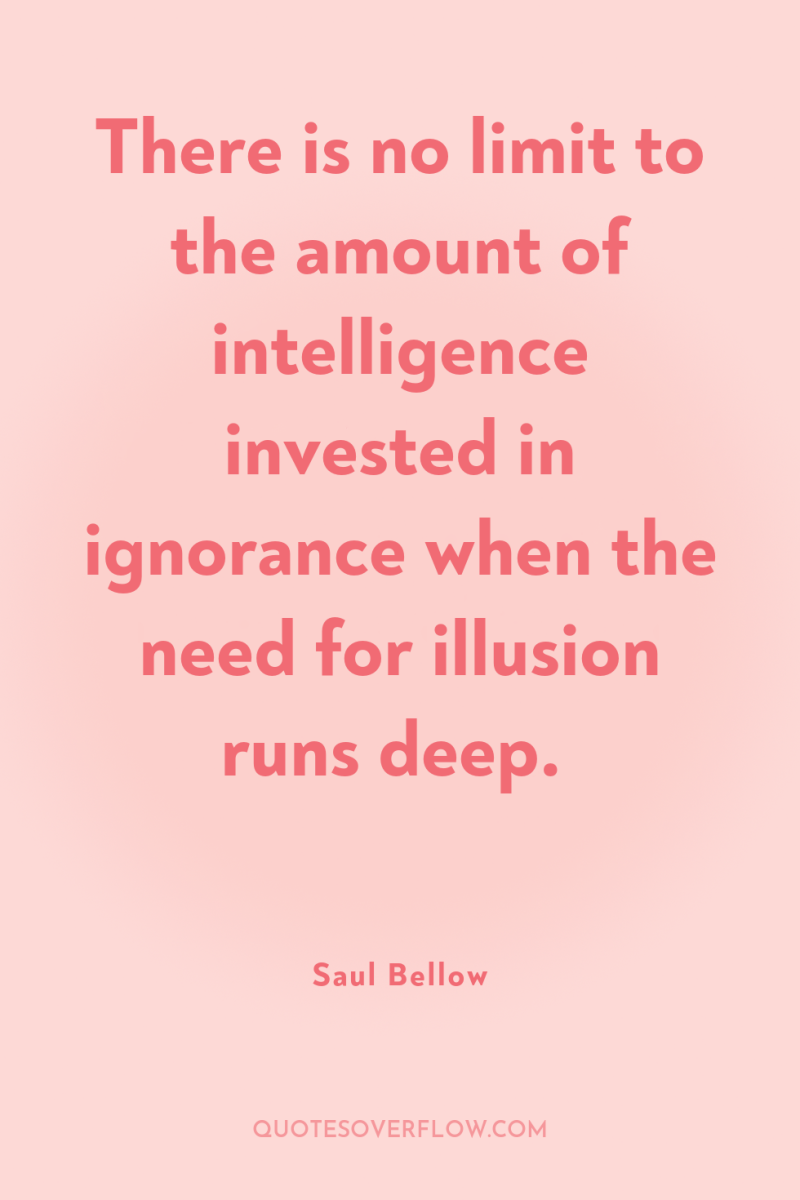
There is no limit to the amount of intelligence invested in ignorance when the need for illusion runs deep.Saul Bellow
Anything that just adds information you can't use is plain dangerous. Anyway, there's too much of everything of this kind, that's come home to me, too much history and culture to keep track of, too many details, too much news, too much example, too much influence, too many guys who tell you to be as they are, and all this hugeness, abundance, turbulence, Niagara Falls torrent. Which who is supposed to interpret? Me? I haven't got that much head to master it all. I get carried away. It doesn't give my feelings enough of a chance if I have to store up and become like an encyclopedia. Why, just as a question of time spent in getting prepared for life, look! a man could spent forty, fifty, sixty years like that inside the walls of his own being. And all high conversation would take place within those walls. And all achievement would stay within those walls. And all glamour too. And even hate, monstrousness, enviousness, murder, would be inside them. This would be only a terrible, hideous dream about existing. It's better to dig ditches and hit other guys with your shovel than die in the walls.Saul Bellow
If you could arrange to avoid that routine job-world, you were an intellectual or an artist. Too restless, tremorous, agitated, too mad to sit at a desk eight hours a day, you needed an institution - a higher institution.Saul Bellow
For instance? Well, for instance, what it means to be a man. In a city. In a century. In transition. In a mass. Transformed by science. Under organized power. Subject to tremendous controls. In a condition caused by mechanization. After the late failure of radical hopes. In a society that was no community and devalued the person. Owing to the multiplied power of numbers which made the self negligible. Which spent military billions against foreign enemies but would not pay for order at home. Which permitted savagery and barbarism in its own great cities. At the same time, the pressure of human millions who have discovered what concerted efforts and thoughts can do. As megatons of water shape organisms on the ocean floor. As tides polish stones. As winds hollow cliffs. The beautiful supermachinery opening a new life for innumerable mankind. Would you deny them the right to exist? Would you ask them to labor and go hungry while you yourself enjoyed old-fashioned Values? You–you yourself are a child of this mass and a brother to all the rest. or else an ingrate, dilettante, idiot. There, Herzog, thought Herzog, since you ask for the instance, is the way it runs. .Saul Bellow
But then why shouldn't he write the dead? He lived with them as much as with the living - perhaps more; and besides, his letters to the living were increasingly mental, and anyway, to the Unconscious, what was death? Dreams did not recognize it.Saul Bellow
The challenge of modern freedom, or the combination of isolation and freedom which confronts you, is to make yourself up. The danger is that you may emerge from the process as a not-entirely-human creature.Saul Bellow
As the wicked flee when none pursueth, so does the middle-class wrestle when none contendeth. They cried out for freedom, it came down on them in a flood. Nothing remains but a few floating timbers of psychotherapy.Saul Bellow
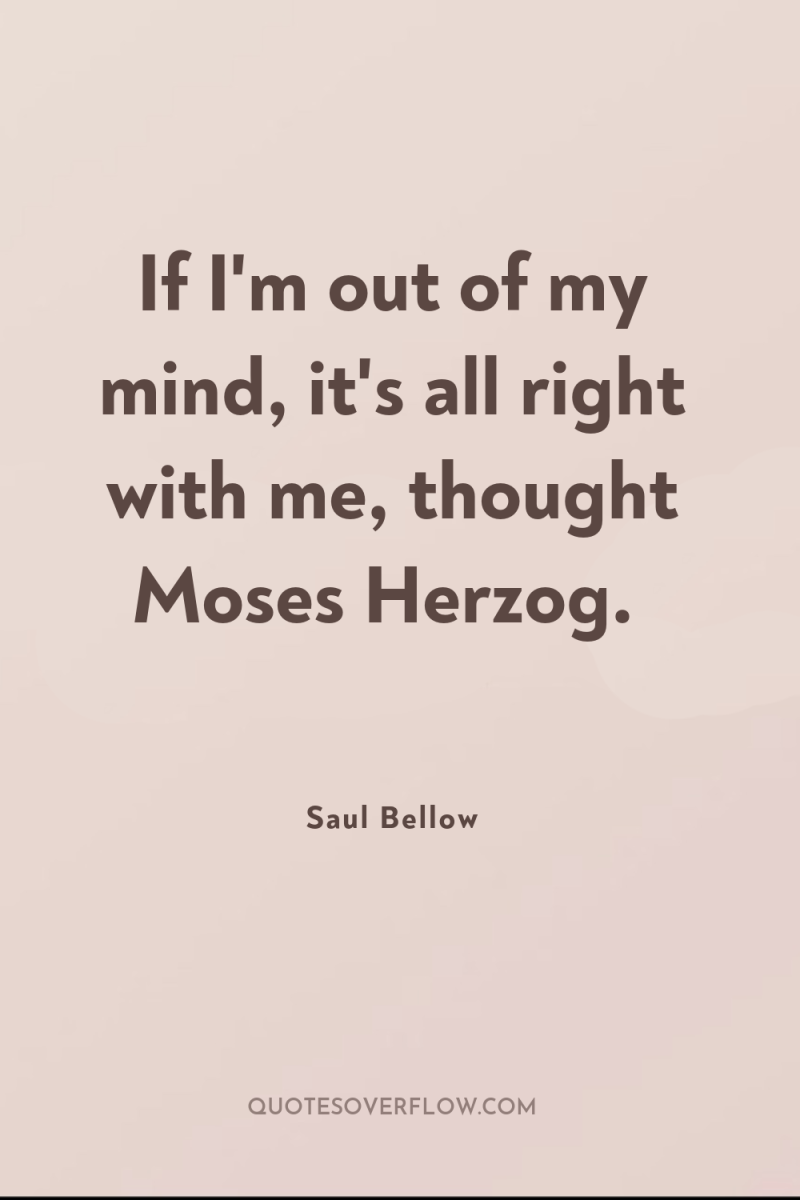
If I'm out of my mind, it's all right with me, thought Moses Herzog.Saul Bellow
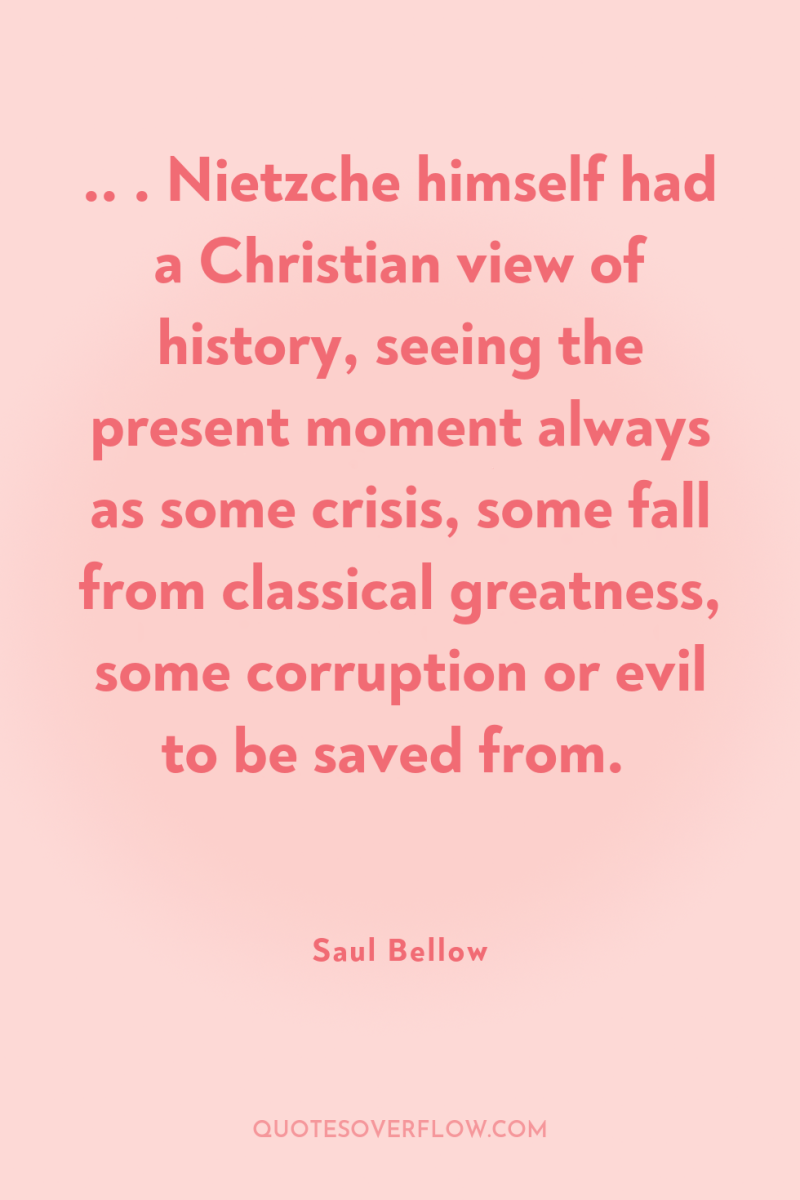
.. . Nietzche himself had a Christian view of history, seeing the present moment always as some crisis, some fall from classical greatness, some corruption or evil to be saved from.Saul Bellow
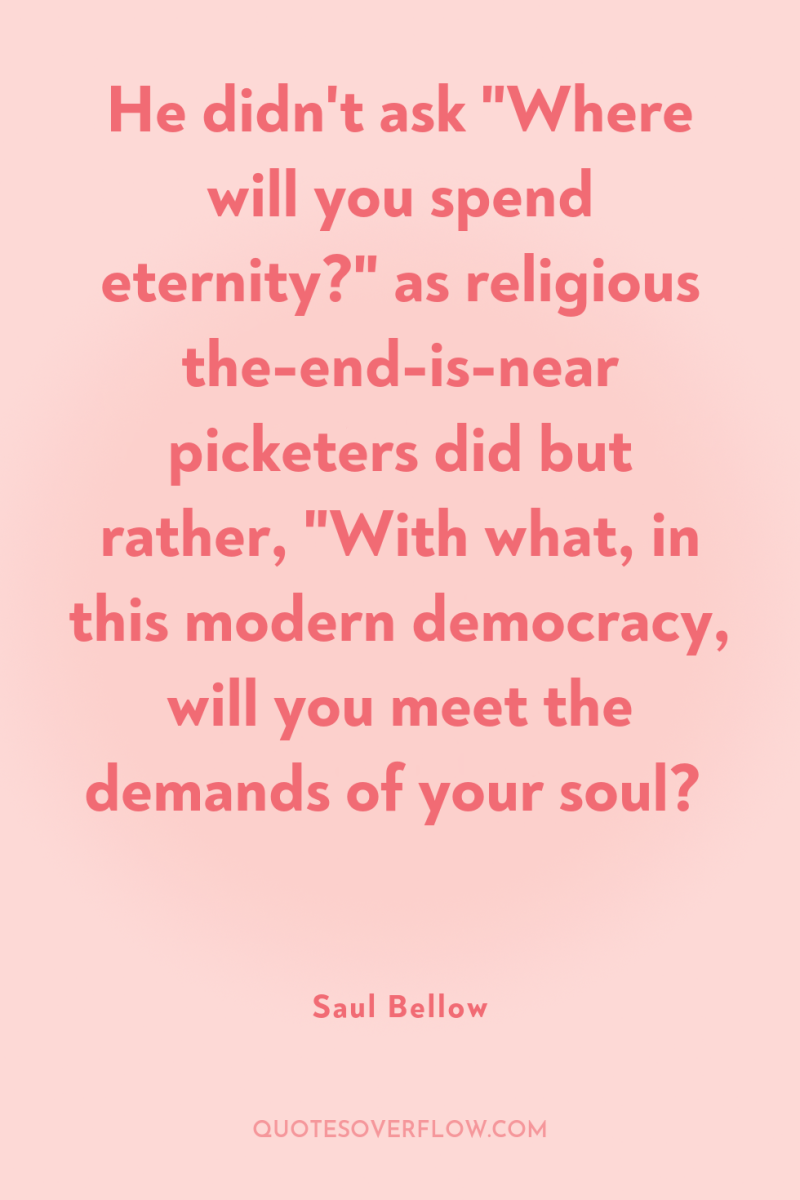
He didn't ask "Where will you spend eternity?" as religious the-end-is-near picketers did but rather, "With what, in this modern democracy, will you meet the demands of your soul?Saul Bellow
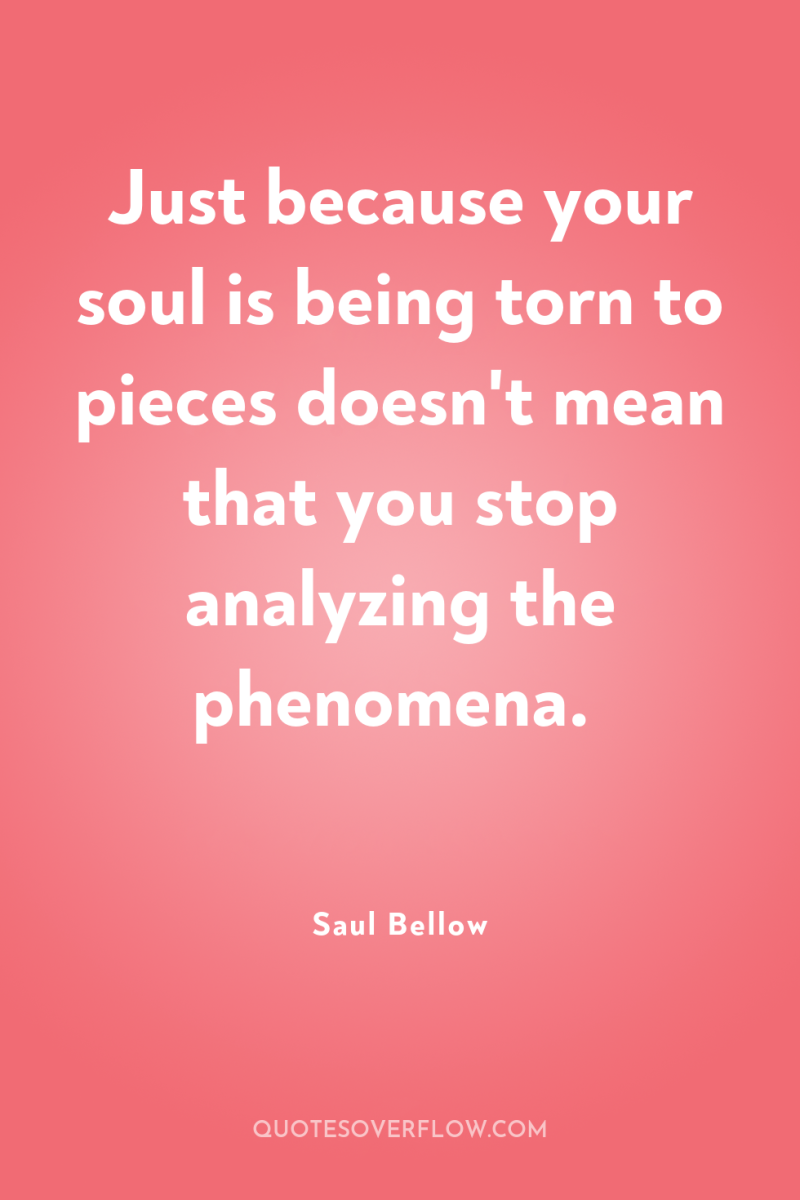
Just because your soul is being torn to pieces doesn't mean that you stop analyzing the phenomena.Saul Bellow
No true individual has existed yet, able to live, able to die. Only diseased, tragic, or dismal and ludicrous fools who sometimes hoped to achieve some ideal by fiat, by their great desire for it. But usually by bullying all mankind into believing them.Saul Bellow
The human being now simply can't close his elected garment about himself. Obligations to one's fellows perhaps prevent full buttoning by artists.Saul Bellow
People can lose their lives in libraries. They ought to be warned.Saul Bellow
A great deal of intelligence can be invested in ignorance when the need for illusion is deep.Saul Bellow
And this is the unwritten history of man, his unseen, negative accomplishment, his power to do without gratification for himself provided there is something great, something into which his being, and all beings can go. He does not need meaning as long as such intensity has scope. Because then it is self-evident; it is meaning.Saul Bellow
History, memory - that is what makes us human, that, and our knowledge of death: 'by man came death'. For knowledge of death makes us wish to extend our lives at the expense of others. And this is the root of the struggle for power.Saul Bellow
More commonly suffering breaks people, crushes them, and is simply unilluminating. You see how gruesomely human beings are destroyed by pain, when they have the added torment of losing their humanity first, so that their death is a total defeat...Saul Bellow
You have to have the power to employ pain, to repent, to be illuminated, you must have the opportunity and even the time.Saul Bellow
I discovered, however, in the early days of our marriage that, in having her way, she put my interests ahead of her own.Saul Bellow
Moses loved his relatives quite openly and even helplessly .. . It was childish of him; he knew that. He could only sigh at himself, that he should be so undeveloped on that significant side of his nature.Saul Bellow
In every community there is a class of people profoundly dangerous to the rest. I don't mean the criminals. For them we have punitive sanctions. I mean the leaders. Invariably the most dangerous people seek the power. While in the parlors of indignation the right-thinking citizen brings his heart to a boil. (p. 51)Saul Bellow
Well, there is a piece of famous advice, grand advice even if it is German, to forget what you can't bear. The strong can forget, can shut out history. Very good. Even if it is self-flattery to speak of strength--these aesthetic philosophers, they take a posture, but power sweeps postures away. Still, it's true you can't go on transposing one nightmare into another, Nietzsche was certainly right about that. The tender-minded must harden themselves. Is this world nothing but a barren lump of coke? No, no, but what sometimes seems a system of prevention, a denial of what every human being knows. I love my children, but I am the world to them, and bring them nightmares. I had this child by my enemy. And I love her. The sight of her, the odor of her hair, this minute, makes me tremble with love. Isn't it mysterious how I love the child of my enemy? But a man doesn't need happiness for himself. No, he can put up with any amount of torment--with recollections, with his own familiar evils, despair. And this is the unwritten history of man, his unseen, negative accomplishment, his power to do without gratification for himself provided there is something great, something into which his being, and all beings can go. He does not need meaning as long as such intensity has scope. Because then it is self-evident; it is meaning. .Saul Bellow
Society is what beats me. Alone I can be pretty good, but let me go among people and there’s the devil to pay.Saul Bellow
One thought-murder a day keeps the psychiatrist away.Saul Bellow
Some people embrace their gifts with gratitude. Others have no use for them and can think only of overcoming their weaknesses. Only their defects interest and challenge them. Thus those who hate people may seek them out. Misanthropes often practice psychiatry. The shy become performers. Natural thieves look for positions of trust. The frightened make bold moves.Saul Bellow
And everything soon must change. Men would set their watches by other suns than this. Or time would vanish. We would need no personal names of the old sort in the sidereal future, nothing being fixed. We would be designated by other nouns. Days and nights would belong to the museums. The earth a memorial park, a merry-go-round cemetery. The seas powdering our bones like quartz, making sand, grinding our peace for us by the aeon. Well, that would be good - a melancholy good.Saul Bellow
Everybody wants to have intimate conversations, but the smart fellows don't give out, only the fools. The smart fellows talk intimately about the fools, and examine them all over and give them advice.Saul Bellow
Oh, God, ” Wilhelm prayed, “Let me out of my trouble. Let me out of my thoughts, and let me do something better with myself. For all the time I have wasted I am very sorry. Let me out of this clutch and into a different life. For I am all balled up. Have mercy.Saul Bellow
All human accomplishment has this same origin, identically. Imagination is a force of nature. Is this not enough to make a person full of ecstasy? Imagination, imagination, imagination! It converts to actual. It sustains, it alters, it redeems!Saul Bellow
At times I feel like a socket that remembers its tooth.Saul Bellow
I am willing without further exercise in pain to open my heart. And this needs no doctrine or theology of suffering. We love apocalypses too much, and crisis ethics and florid extremism with its thrilling language. Excuse me, no. I've had all the monstrosity I want.Saul Bellow
I venture to say Kierkegaard meant that truth has lost its force with us and horrible pain and evil must teach it to us again, the eternal punishments of Hell will have to regain their reality before mankind turns serious once more. I do not see this. Let us set aside the fact that such convictions in the mouths of safe, comfortable people playing at crisis, alienation, apocalypse and desperation, make me sick. We must get it out of our heads that this is a doomed time, that we are waiting for the end, and th rest of it, mere junk from fashionable magazines. Things are grim enough without these shivery games. People frightening one another--a poor sort of moral exercise. But, to get to the main point, the advocacy and praise of suffering take us in the wrong direction and those of us who remain loyal to civilization must not go for it. You have to have the power to employ pain, to repent, to be illuminated, you must have the opportunity and even the time.Saul Bellow
Just then his state of being was so curious that he was compelled , himself, to see it -- eager, grieving, fantastic, dangerous, crazed and, to the point of death, "comical." It was enough to make a man pray to God to remove this great, bone-breaking burden of selfhood and self-development, give himself, a failure, back to the species for a primitive cure.Saul Bellow
The ocean was waiting with grand and bitter provocations, as if it invited you to think how deep it was, how much colder than your blood or saltier, or to outguess it, to tell which were its feints or passes and which its real intentions, meaning business.Saul Bellow
Brother raises a hand against brother and son against father (how terrible! ) and the father also against son. And moreover it is a continuity-matter, for if the father did not strike the son, they would not be alike. It is done to perpetuate similarity. Oh, Henderson, man cannot keep still under the blows.. A hit B? B hit C?--we have not enough alphabet to cover the condition. A brave man will try to make the evil stop with him. He shall keep the blow. No man shall get it from him, and that is a sublime ambition.Saul Bellow
A professor from UBC observed that he agreed with Alexander Pope about the ultimate unreality of evil. Seen from the highest point of metaphysics. To a rational mind, nothing bad ever really happens. He was talking high-minded balls. Twaddle! I thought. I said, 'Oh? Do you mean that every gas chamber has a silver lining?Saul Bellow
I am not an ornithologist– I am a bird.Saul Bellow
. [T]o live in an inspired condition, to know truth, to be free, to love another, to consummate existence, to abide with death in clarity of consciousness - without which, racing and conniving to evade death, the spirit holds its breath and hopes to be immortal because it does not live - is no longer a rarefied project. Just as machinery has embodied ideas of good, so the technology of destruction has also acquired a metaphysical character. The practical questions have thus become the ultimate questions as well. Annihilation is no longer a metaphor. Good and Evil are real. The inspired condition is therefore no visionary matter. It is not reserved for gods, kings, poets, priests, shrines, but belongs to mankind and to all of existence.Saul Bellow
He knew what retributions your devils are liable to bring for the way you treat your wife and women or behave while your father is on his deathbed, what you ought to think of your pleasure, of acting like a cockroach; he had the intelligence for the comparison. He had the intelligence to be sublime. But sublimity can't exist only as a special gift of the few, due to an accident of origin, like being born an albino. If it were, what interest would we have in it?.Saul Bellow
Everybody needs his memories. They keep the wolf of insignificance from the door.Saul Bellow
Even if I am not the honestest type in the world I don't want to lie more than is average.Saul Bellow
Strict and literal truthfulness was a trivial game and might even be a disagreeable neurotic affliction.Saul Bellow
What did Danton lose his head for, or why was there a Napoleon, if it wasn't to make a nobility of us all?Saul Bellow
If you could have confidence in nature you would not have to fear. It would keep you up. Creative is nature. Rapid. Lavish. Inspirational. It shapes leaves. It rolls the waters of the earth. Man is the chief of this. All creations are his just inheritance. You don't know what you've got within you. A person either creates or he destroys. There is no neutrality.Saul Bellow
Every treasure is guarded by dragons. That's how you can tell it's valuable.Saul Bellow
In the history of the world many souls have been, are, and will be, and with a little reflection this is marvelous and not depressing. Many jerks are made gloomy about it, for they think quantity buries them alive. That's just crazy. Numbers are very dangerous, but the main thing about them is that they humble your pride. And that's good.Saul Bellow
Maybe America didn't need art and inner miracles. It had so many outer ones. The USA was a big operation, very big. The more it, the less we.Saul Bellow
What this means is not a single Tower of Babel plotted in common, but hundreds of thousands of separate beginnings, the length and breadth of America. Energetic people who build against pains and uncertainties, as weaker ones merely hope against them.Saul Bellow
The earth was a grave: our life was lent to it by its elements and had to be returned: a time came when the simple elements seemed to long for release from the complicated forms of life, when every element of every cell said, "Enough! " The planet was our mother and our burial ground. No wonder the human spirit wished to leave. Leave this prolific belly. Leave also this great tomb. Passion for the infinite caused by the terror, by timor mortis, needed material appeasement.Saul Bellow
I should have written you a letter, it was too late to make the deaths of my brothers an excuse. Since they died, I wrote a book; why not a letter? A mysterious but truthful answer is that while I can gear myself up to do a novel, letters, real-life communications, are too much for me. I used to rattle them off easily enough; why is the challenge of writing to friends and acquaintances too much for me now? Because I have become such a solitary, and not in the Aristotelian sense: not a beast, not a god. Rather, a loner troubled by longings, incapable of finding a suitable language and despairing at the impossibility of composing messages in a playable key--as if I no longer understood the codes used by the estimable people who wanted to hear from me and would have so much to reply if only the impediments were taken away. .Saul Bellow
I am a prisoner of perception, a compulsory witness.Saul Bellow
The noise of the world is so terrible that we can endure it only by being coated with sleep.Saul Bellow
Your authority and my degeneracy are one in the same.Saul Bellow
The Indian temperament is so excitable, you know.Saul Bellow
Shall I run back into the desert ... and stay there until the devil has passed out of me and I am fit to meet human kind again without driving it to despair at the first look? I haven't had enough desert yet.Saul Bellow
No school without spectacular eccentrics and crazy hearts is worth attending.Saul Bellow
After much effort to live up to a glorious standard there came fatigue, wan hope, and boredom. I experienced extreme boredom. I saw others experiencing it too, many denying, by the way, that any such thing existed. And finally I decided that I would make boredom my subject matter. That I'd study it. That I'd become the world's leading authority on it. March, that was a red-letter day for humanity. What a field! What a domain! Titanic! Promethean! I trembled before it. I was inspired. I couldn't sleep. Ideas came in the night and I wrote them down, volumes of them. Strange that no one had gone after this systematically. Oh, melancholy, yes, but not modern boredom. .Saul Bellow
You never have to change anything you get up in the middle of the night to write.Saul Bellow
Bringing people into the here-and-now. The real universe. That's the present moment. The past is no good to us. The future is full of anxiety. Only the present is real--the here-and-now. Seize the day.Saul Bellow
It was probably no accident that it was the cripple Hephaestus who made ingenious machines; a normal man didn't have to hoist or jack himself over hindrances by means of cranks, chains and metal parts. Then it was in the line of human advance that Einhorn could do so much.Saul Bellow
The flesh would shrink and go, the blood would dry, but no one believes in his mind of minds or heart of hearts that the pictures do stop.Saul Bellow
Emancipation resulting in madness. Unlimited freedom to choose and play a tremendous variety of roles with a lot of coarse energy.Saul Bellow
God may save all, but human rescue is only for a few.Saul Bellow
Many common lies and hypocrisies are like that, just out of the harmony of the moment.Saul Bellow
Whenever I write a dramatic poem I can't understand why the characters should ever want to be anything but poets themselves.Saul Bellow
The sun was shut up in a cold bottle.Saul Bellow
A man should be able to hear, and to bear, the worst that could be said of him.Saul Bellow
New York makes one think of the collapse of civilization, about Sodom and Gomorrah, the end of the world. The end wouldn't come as a surprise here. Many people already bank on it.Saul Bellow
People don't realize how much they are in the grip of ideas. We live among ideas much more than we live in nature.Saul Bellow
Boredom is the conviction that you can't change ... the shriek of unused capacities.Saul Bellow
What–in other words–would modern boredom be without terror? One of the most boring documents of all time is the thick volume of Hitler’s Table Talk. He too had people watching movies, eating pastries, and drinking coffee with Schlag while he bored them, while he discoursed theorized expounded. Everyone was perishing of staleness and fear, afraid to go to the toilet. This combination of power and boredom has never been properly examined. Boredom is an instrument of social control. Power is the power to impose boredom, to command stasis, to combine this stasis with anguish. The real tedium, deep tedium, is seasoned with terror and with death. There were even profounder questions. For instance, the history of the universe would be very boring if one tried to think of it in the ordinary way of human experience. All that time without events! Gases over and over again, and heat and particles of matter, the sun tides and winds, again this creeping development, bits added to bits, chemical accidents–whole ages in which almost nothing happens, lifeless seas, only a few crystals, a few protein compounds developing. The tardiness of evolution is so irritating to contemplate. The clumsy mistakes you see in museum fossils. How could such bones crawl, walk, run? It is agony to think of the groping of the species–all this fumbling, swamp-creeping, munching, preying, and reproduction, the boring slowness with which tissues, organs, and members developed. And then the boredom also of the emergence of the higher types and finally of mankind, the dull life of paleolithic forests, the long long incubation of intelligence, the slowness of invention, the idiocy of peasant ages. These are interesting only in review, in thought. No one could bear to experience this. The present demand is for a quick forward movement, for a summary, for life at the speed of intensest thought. As we approach, through technology, the phase of instantaneous realiza-tion, of the realization of eternal human desires or fantasies, of abolishing time and space the problem of boredom can only become more intense. The human being, more and more oppressed by the peculiar terms of his existence–one time around for each, no more than a single life per customer–has to think of the boredom of death. O those eternities of nonexistence! For people who crave continual interest and diversity, O! how boring death will be! To lie in the grave, in one place, how frightful! .Saul Bellow
Socrates tried to soothe us, true enough. He said there were only two possibilities. Either the soul is immortal or, after death, things would be again as blank as they were before we were born. This is not absolutely comforting either. Anyway it was natural that theology and philosophy should take the deepest interest in this. They owe it to us not to be boring themselves. On this obligation they don’t always make good. However, Kierkegaard was not a bore. I planned to examine his contribution in my master essay. In his view the primacy of the ethical over the esthetic mode was necessary to restore the balance. But enough of that. In myself I could observe the following sources of tedium: 1) The lack of a personal connection with the external world. Earlier I noted that when I was riding through France in a train last spring I looked out of the window and thought that the veil of Maya was wearing thin. And why was this? I wasn’t seeing what was there but only what everyone sees under a common directive. By this is implied that our worldview has used up nature. The rule of this view is that I, a subject, see the phenomena, the world of objects. They, however, are not necessarily in themselves objects as modern rationality defines objects. For in spirit, says Steiner, a man can step out of himself and let things speak to him about themselves, to speak about what has meaning not for him alone but also for them. Thus the sun the moon the stars will speak to nonastronomers in spite of their ignorance of science. In fact it’s high time that this happened. Ignorance of science should not keep one imprisoned in the lowest and weariest sector of being, prohibited from entering into independent relations with the creation as a whole. The educated speak of the disenchanted (a boring) world. But it is not the world, it is my own head that is disenchanted. The world cannot be disenchanted. 2) For me the self-conscious ego is the seat of boredom. This increasing, swelling, domineering, painful self-consciousness is the only rival of the political and social powers that run my life (business, technological-bureaucratic powers, the state). You have a great organized movement of life, and you have the single self, independently conscious, proud of its detachment and its absolute immunity, its stability and its power to remain unaffected by anything whatsoever – by the sufferings of others or by society or by politics or by external chaos. In a way it doesn’t give a damn. It is asked to give a damn, and we often urge it to give a damn but the curse of noncaring lies upon this painfully free consciousness. It is free from attachment to beliefs and to other souls. Cosmologies, ethical systems? It can run through them by the dozens. For to be fully conscious of oneself as an individual is also to be separated from all else. This is Hamlet’s kingdom of infinite space in a nutshell, of “words, words, words, ” of “Denmark’s a prison.Saul Bellow
Anyhow, I had found something out about an unknown privation, and I realized how a general love or craving, before it is explicit or before it sees its object, manifests itself as boredom or some other kind of suffering. And what did I think of myself in relation to the great occasions, the more sizable being of these books? Why, I saw them, first of all. So suppose I wasn't created to read a great declaration, or to boss a palatinate, or send off a message to Avignon, and so on, I could see, so there nevertheless was a share for me in all that had happened. How much of a share? Why, I knew there were things that would never, because they could never, come of my reading. But this knowledge was not so different from the remote but ever-present death that sits in the corner of the loving bedroom; though it doesn't budge from the corner, you wouldn't stop your loving. Then neither would I stop my reading. I sat and read. I had no eye, ear, or interest for anything else--that is, for usual, second-order, oatmeal, mere-phenomenal, snarled-shoelace-carfare-laundry-ticket plainness, unspecified dismalness, unknown captivities; the life of despair-harness or the life of organization-habits which is meant to supplant accidents with calm abiding. Well, now, who can really expect the daily facts to go, toil or prisons to go, oatmeal and laundry tickets and the rest, and insist that all moments be raised to the greatest importance, demand that everyone breathe the pointy, star-furnished air at its highest difficulty, abolish all brick, vaultlike rooms, all dreariness, and live like prophets or gods? Why, everybody knows this triumphant life can only be periodic. So there's a schism about it, some saying only this triumphant life is real and others that only the daily facts are. For me there was no debate, and I made speed into the former.Saul Bellow
Some big insect flew in and began walking on the table. I don’t know what insect it was, but it was brown, shining, and rich in structures. In the city the big universal chain of insects gets thin, but where there’s a leaf or two it’ll be represented.Saul Bellow
I think that New York is not the cultural centre of America but the business and administrative centre of American culture.Saul Bellow
Alternatives and particularly desirable alternatives grow only on imaginary trees.Saul Bellow
The truth is we've not really developed a fiction that can accommodate the full tumult the zaniness and crazed quality of modern experience.Saul Bellow
There is today an extraordinary interest with the data of modern experience per se. Our absorption in our contemporary historical state is very high right now. It's not altogether unlike a similar situation in seventeenth century Holland where wealthy merchants wanted their portraits done with all their blemishes included. It is the height of egotism in a sense to think even one's blemishes are of significance. So today Americans seem to want their writers to reveal all their weaknesses their meannesses to celebrate their very confusions. And they want it in the most direct possible way - they want it served up neat as it were without the filtering and generalizing power of fiction.Saul Bellow
All a writer has to do to get a woman is to say he's a writer. It's an aphrodisiac.Saul Bellow
Our society like decadent Rome has turned into an amusement society with writers chief among the court jesters - not so much above the clatter as part of it.Saul Bellow
I have always had a weakness for footnotes. For me a clever or a wicked footnote has redeemed many a text. And I see that I am now using a long footnote to open a serious subject - shifting in a quick move to Paris, to a penthouse in the Hotel Crillon. Early June. Breakfast time. The host is my good friend Professor Ravelstein, Abe Ravelstein. My wife and I, also staying at the Crillon, have a room below, on the sixth floor. She is still asleep. The entire floor below ours (this is not absolutely relevant but somehow I can't avoid mentioning it) is occupied just now by Michael Jackson and his entourage. He performs nightly in some vast Parisian auditorium. Very soon his French fans will arrive and a crowd of faces will be turned upward, shouting in unison, 'Miekell Jack-sown'. A police barrier holds the fans back. Inside, from the sixth floor, when you look down the marble stairwell you see Michael's bodyguards. One of them is doing the crossword puzzle in the 'Paris Herald'.Saul Bellow
Wie Gott in Frankreich'' was the expression used by the Jews of Eastern Europe to describe perfect happiness. I puzzled over this simile for many years, and I think I can interpret it now. God would be perfectly happy in France because he would not be troubled by prayers, observances, blessings and demands for the interpretation of difficult dietary questions. Surrounded by unbelievers He too could relax toward evening, just as thousands of Parisians do at their favorite cafes. There are few things more pleasant, more civilized than a tranquil terrasse at dusk.Saul Bellow
Happiness can only be found if you can free yourself of all other distractions.Saul Bellow
When we ask for advice, we are usually looking for an accomplice.Saul Bellow
What is art but a way of seeing?Saul Bellow